Home |
Contents |
Photos |
News |
Reviews |
Store |
Forum |
ICI |
Educators |
Fans |
Contests |
Help |
FAQ |
Info


Origin of the Culture Wars
Or, Why America Is Still Violent
(11/5/99)
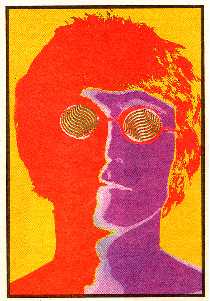 I'm a huge fan of the 1960s. It was the first time we dared, as a country, to question our cultural paradigms. Though the solutions—"Make love, not war"..."Give peace a chance"..."Flower power"..."Imagine"—were simplistic, they were also right on. For once we heard an alternative to "Grow up," "Join the rat race," "Keep up with the Joneses," and "Die."
I'm a huge fan of the 1960s. It was the first time we dared, as a country, to question our cultural paradigms. Though the solutions—"Make love, not war"..."Give peace a chance"..."Flower power"..."Imagine"—were simplistic, they were also right on. For once we heard an alternative to "Grow up," "Join the rat race," "Keep up with the Joneses," and "Die."
Not coincidentally, this was the first time we listened to the people without voices. The young, women, minorities such as Native Americans. It wasn't our leaders, the power elite, who saw the need for change. It was the people on the outside looking in.
Political writer Bill Boyarsky describes how the right reacted to the '60s in his review of Before the Storm by Rick Perlstein and Suburban Warriors by Lisa McGirr. From the LA Times, 4/15/01:
The right's themes, while seeming out of step at the height of the civil rights movement and the Great Society, were actually very much in tune with the growing fears of white middle-class and upper-class America. "Blacks staged sit-ins at Southern lunch counters, rode through Dixie on buses alongside of whites in defiance of local laws and in accordance with the rulings of the United States Supreme Court marched through the streets of Southern cities in ever-escalating confrontation with the customs and codes of segregation," Perlstein writes. "Millions thrilled to the moral transcendence of these heroic warriors for freedom. Millions more—perhaps communist dupes—were spitting on law and order, overturning settled ways of life with reckless abandon and might not stop until they had forced their way into their own Northern white neighborhoods." Millions, he writes, were stirred by Johnson's War on Poverty, but millions more "wondered why these people couldn't help themselves."
Or, as McGirr writes, "Concerns over 'law and order' and 'morality' and attacks on 'sophisticated intellectuals' moved to center stage. As American liberalism began to unravel, the focus of the Right's discourse shifted away from communism toward a more direct attack on 'liberal humanism' and the 'open society.' This shift in focus—which went hand in hand with the rise of the New Left, the student movement, the counterculture, the civil rights struggles in the North and the Vietnam War—represented not fundamentally new concerns but rather new terrains of struggle...."
After the '60s
The battles continued through the '70s, as the environmental and feminist movements took off and people continued to demand an end to Vietnam. Watergate represented the ultimate battle and the ultimate victory for the left. Unfortunately, the momentum was lost as the nation sunk into a quagmire of oil embargoes and stagflation.
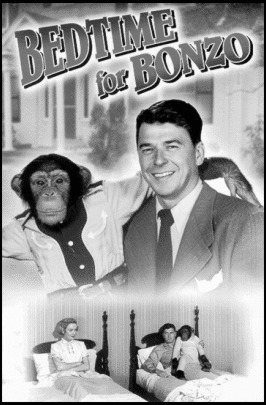
Then came the 1980s, with Reagan preaching to the "Me Generation." A father figure promised a weary nation a return to its selfish pre-'60s days, when society was closed rather than open and "inhumanism" rather than humanism reigned. Suddenly feeling good about yourself was in, caring and compassion were out. The person with the most toys won. Etc.
Nor did this change under Clinton or Bush. Clinton promised a liberal agenda but pandered to the right, compromising his alleged values. Bush promised a "compassionate" agenda but pandered to the far right, compromising his his alleged values. Neither one inspired a genuine transformation like the leaders of the '60s did.
Now we're being whipsawed between these two extremes: the need for change and the backlash against it. People are looking for answers, which is why spiritual and self-help movements are going strong. But they're also looking out for No. 1, which is why business start-ups and stock options are so popular.
Signs that our culture is out of balance are everywhere. One could go on and on. Sports stars with $100-million contracts. Fox TV wanting to crash a plane as entertainment. A president having sex in the Oval Office...and being impeached for it.
Consider the latest "crush" videos. They show human heels crushing little animals (e.g., baby mice) into pulp. If there's a better sign of an out-of-kilter culture—a society that isn't living in harmony—I don't know what it is.
Only in America could these things happen. And what messages do they send our youth? That big money is our birthright. Smashing things is our birthright. Sex is our birthright. Power is our birthright, in other words.
And if we don't get what's "ours," look out. Time to make like John Wayne, America's hero, and whip out the guns. If we can't identify a specific target, we'll shoot people at random. Or we'll shoot ourselves. (I don't think it's a coincidence that most of these madmen kill themselves after they kill their victims.)
What's happening is a battle for the American soul. Pat Buchanan called it the "culture wars" and I think he was right. Only he's on the wrong side of the conflict, as far as I'm concerned.
His way is to retreat into the black-and-white past. Where everything was rosy if you ignored poverty, pollution, and human rights. My way is to embrace change and tackle the problems head-on. To implement the solutions in front of us, if only we're smart enough to see them.
A cult(ure) of killing
As many have noted, our almost-unique obsession with capital punishment is a prime indicator of our unhealthy culture. It betokens our obsession with right and wrong, winning and losing, being No. 1.

Here's an excerpt from Norah Vincent's column on Attorney General John Ashcroft's plan to televise Tim McVeigh's execution. In the LA Times, 4/22/01:
How noble, how Christian of Ashcroft to cater so willingly to the "needs" of our very own willing executioners. And yet, how ironic. In V-chip nation, where parents are so concerned about the violence their children see on television, people are watching murder live on the box. What's more, they're having it piped in, special delivery, by none other than the Justice Department. So this is what's meant by compassionate conservatism.
Or is it the ultimate in reality TV? We shouldn't wonder, then, why Columbine-style school shootings are becoming a national sport. We blame it on Hollywood. We blame it on the gun lobby. But that's merely a deflection of responsibility. Our children's maladjustment is the fruit of our own example. We scratch our heads, wondering why, while overlooking the patent fact that those same children are being raised in a nation whose notion of justice is, apparently, one word long—payback—and whose thirst for blood outstrips human decency.
The implicit message is clear. When someone shatters your life, takes away everything you care about, decimates your emotional equilibrium, as happened to the victims and their families in Oklahoma City, you're not only entitled to kill him, you're entitled to make a public spectacle out of the killing, a media event. Think about it.
Put yourself in the shoes of a teenager whose world is almost entirely circumscribed by the walls of his school. Your girlfriend dumps you. You're denied a diploma. You've been put down repeatedly as a loser, socially crushed by the people whose opinion matters most to you, your peers. What now? In your solipsistic, adolescent worldview, you're as devastated as a parent who's lost a child or a husband who's lost his wife. And you want revenge. You want to kill the killer, and you want his death to be witnessed by the world because only then will it mean something to you. Only then will your "needs" be met, your grief assuaged. Sounds conspicuously like us, doesn't it?
The only flaw in Vincent's analysis is her implicit attempt to blame America's violence on a liberal needs-based culture. How are our "needs" the issue when Americans have always loved executions and killing? This country was founded on a philosophy of genocide, after all.
But the problem has grown worse in recent years. Is that because the '60s focused on the "needs" of people—minorities, the poor, women—who went unacknowledged for so long? No, it's because the '80s focused on the "need" of well-off Americans to selfishly satisfy themselves rather than selflessly help other people.
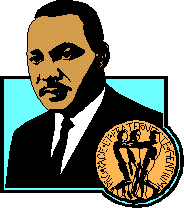
In other words, don't blame progressives like Kennedy and King who wanted to change society. Blame reactionaries like Reagan and Buchanan who wanted to change it back.
Revolt against conformity
What exactly were the '60s a rebellion against? The homogenized culture of the '50s, of course. An excerpt from "Beach Party Jingo," a book review by Jonathan Kirsch. In the LA Times, 5/19/02:
"All good teenagers go to California," Brian Wilson once quipped, "when they die." Wilson's remark, far edgier and more richly ironic than any of the hit songs he wrote and sang for the Beach Boys, is invoked by Kirse Granat May in "Golden State, Golden Youth," a study that deconstructs the popular culture of postwar America and shows exactly how the California dream and the cult of youth came to be linked in powerful but also cynical and even ominous ways.
May, a historian who lives in Boston, digs through the accumulation of clichés and conventional wisdom about the California youth culture, and reveals how the whole phenomenon can be seen as the handiwork of media and marketing entrepreneurs, driven by the profit motive and something much deeper and darker—the fear of class, race and generational conflict.
"Aware of the possibilities of television, music, and film to create a model of the good society, popular culture focused on the commercial possibilities of the baby boomers," writes May. "A new definable teenage type was created, and it was an ideal of exclusion: white, middle-class, mobile, carefree and conformist."
May is willing to name names, and she assigns Walt Disney a crucial role in the invention of the youth culture and the conscious decision to plant it in the rich soil of California. The opening of Disneyland in 1955 fixed California in the collective consciousness of a whole generation—and, indeed, the whole world—as "the land of America's destiny." Above all, Disney elevated the pursuit of happiness from an aspiration into a commodity to be packaged and sold to what May dubs "the child imagination market."
"By creating a monument to the dreams of youth, Disney offered a privileged model of life for mass consumption," she explains. "He turned his corner of the California world into an international symbol of 'the good life.' "

"Golden State, Golden Youth" invites us to regard the debut of Disneyland as the first of two defining moments for the baby-boom generation, a dividing line between an open-eyed if sometimes grim view of the world and a more comforting but also delusory one that was sold to us along with movies and music, T-shirts and lunch boxes, housing tracts and fast food.
By way of example, May reminds us that "Blackboard Jungle" and "Rebel Without a Cause," both released the same year in which Disneyland opened for business, offered a dark and dire vision of adolescence in America, but these movies did not depict the experience of the boomers and did not address them as an audience; we were still wearing our Davy Crockett coonskin caps and watching "The Mickey Mouse Club." By the time the boomers were old enough to buy their own records and tickets, we put former Mouseketeer Annette Funicello's "Tall Paul" on the charts and lined up to see Sandra Dee in "Gidget."
At its highest and purest expression, the California youth culture is captured in the iconic image of a buxom Funicello on an idyllically empty beach, dressed in a one-piece swimsuit and holding a surfboard—a promotional photo for "Muscle Beach Party," one of a series of beach-party movies from American International Pictures. The promise of freedom and pleasure, sexual and otherwise, is unmistakable, especially for a generation of young men who had passed into puberty watching her grow up on "The Mickey Mouse Club," but the beach-blanket movies were ultimately as safe and sexless as a Disney cartoon.
"We gave the illusion of being daring, but there was a lot of teasing with no real payoff," Sam Arkoff, co-founder of the company that produced "Muscle Beach Party," once told a reporter. The beach-party movies, he explains, depicted a teenage utopia in which there were "no parents, no school, no church, no legal or government authorities, no rich kids or poor kids, no money problems—none of the things that plague the young people today."
The same kind of deception and manipulation, as May shows, was practiced in the music industry. Dennis Wilson was the only member of the Beach Boys who actually surfed, but they elevated the surfing subculture into a shiny new symbol of the California youth culture. The Beach Boys may have lifted their guitar riffs, note for note, from Chuck Berry but, no less than "The Mickey Mouse Club" and "Gidget," they conjured up "a white, middle-class version of youth."
"As the Beach Boys told Time," May writes, "'We're not colored; we're white. And we sing white.' "


Who shall control the culture?
Author and critic Neil Gabler goes further back to show the roots of the conflict: the battle for cultural supremacy between the elites and the masses. He explains why the right wing has lost and will continue to lose the culture wars. From the LA Times, 4/8/01:
...[I]f one reason cultural conservatives are losing the war is that they haven't successfully enlisted grass-roots political conservatives in the cause, another reason is that, despite their heated rhetoric and noise, they just don't have the numbers. When the culture wars first began in this country some 150 years ago, it was because American elites and aristocrats, a tiny faction, feared and tested the rise of a genuinely democratic culture of almanacs, crime pamphlets, dime novels, penny press newspapers, theatrical melodramas, popular music, circuses—anything that seemed to challenge the elites' own cultural supremacy. As they saw it, this new culture, appealing to the masses, threatened the country by degrading both its standards and its morals. It was a culture of the proverbial lowest common denominator.
As the 19th century progressed, the elites gradually gave way to middle-class moralists and reformers, but the moralists' arguments were essentially the same as the aristocrats'. Popular culture undermined American values. It promoted sex, violence, vulgarity and disrespect for authority. This was the argument when cultural conservatives were attacking saloon shows at the end of the 19th century; it was the argument when they attacked silent films, including the films of Charlie Chaplin, early in the 20th century, and when they attacked sexual comedies in the 1920s and gangster pictures in the 1930s; and it is still the argument now when they attack movie blockbusters, cutting-edge TV programs and rock CDs. Nothing changes but the targets themselves.
If the arguments have remained the same, so have the motives. Though one certainly can't impugn the conservatives' sincerity, in professing to save America from the toxin of popular culture, they were also saving themselves. Popular culture promoted the sort of values that further marginalized the critics and made them seem even more old-fashioned and irrelevant to a modern society. It is a war they cannot afford to lose without immolating, so they have to keep soldiering on no matter how inexorably the popular culture seems to advance.
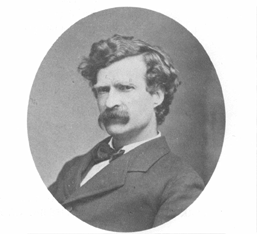
Just so. My only quibble with Gabler's analysis is the so-called sincerity of conservatives. They're aware that popular culture has aimed to overthrow their autocratic control of society. It was true when Mark Twain savaged America's "sivilized" morality in Huckleberry Finn and when Bob Dylan and Joan Baez sang in the '60s. Gabler might have said the culture wars have occurred "because American elites and aristocrats, a tiny faction, feared and tested the rise of a genuinely democratic culture," period.
Culture war = Christian war
The culture war over morality is really a war over religion. The Christians who have dominated our country since the nation's founding are losing their grip. In this multicultural millennium, they can no longer maintain their rich, white privileges or controlling, judgmental attitudes—which ironically go against everything Jesus believed in. They're as mad as hell and not going to take it anymore.
An excerpt from "Politics Remain Stalemated" by William Schneider. In the LA Times, 3/31/02:
The roots of America's political deadlock go back to the great civil rights war of the 1960s, a cultural civil war in which a New Left and a New Right emerged to challenge the country's post-World War II consensus. The center emptied out, especially after Presidents Gerald R. Ford and Jimmy Carter failed to govern effectively from the center. The dominant figures of U.S. politics in the late 20th century were Ronald Reagan and Bill Clinton, two presidents whose political identities were forged by the conflicts of the 1960s. The 2000 election was a showdown between Reaganism and Clintonism. The result? A tie.
Europeans are often perplexed by the failure of Americans to get over "the sixties." After all, they, too, were convulsed by great cultural changes during that turbulent decade. But only the United States experienced a ferocious backlash against those changes, partly based on America's religious culture.
Religion has lost influence everywhere in the industrial world. But in America, it continues to thrive. In the early 1990s, I held a post as visiting professor of American politics at a leading Jesuit university. One of the perquisites of that position was an invitation to tea with the cardinal. After we exchanged pleasantries, the cardinal asked, "Is there anything happening in American politics that I should be aware of?"
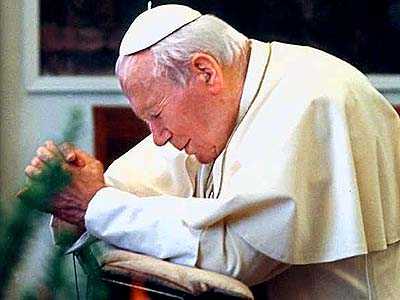
"As a matter of fact, there is," I answered. "Since 1980, religious Americans of all faiths—fundamentalist Protestants, observant Catholics, even Orthodox Jews—have been moving toward the Republican Party. At the same time, secular Americans have found a home in the Democratic Party.
"This is something new in American politics," I explained. "We have never had a religious party in this country." Then I went a fateful step further, adding, "I'm a little uncomfortable with a religious party in this country."
The cardinal pounced. "Well, I'm a little uncomfortable with an irreligious party in this country," he said.
Stalemate.
By 2000, it was even more true that religiosity defined politics. Regular churchgoers voted heavily for then-Texas Gov. George W. Bush. Nonobservant voters went strongly for then-Vice President Al Gore. American politics had become less and less about economic interests and more and more about lifestyle—a 1960s word.
What brought things to a head was Clinton. Clinton created an odd legacy in American politics. He brought the country together on policy and tore the country apart over values.
Clinton really did create a policy consensus. And why not? He stole most of his policies from the Republicans. Clinton's most significant policy achievements—welfare reform, the North American Free Trade Agreement, a balanced budget—passed only because of Republican support.
For most Americans, however, Clinton's most important attribute wasn't his policies. It was his values. He was the first, and so far the only, president to come out of the culture of the 1960s. (Bush is of that generation, but not of that culture.)
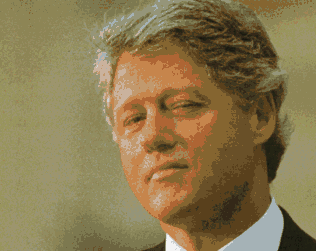
Conservatives never accepted Clinton as legitimate, no matter how much they agreed with his policies. To them, Clinton was the draft dodger, the war protester, the womanizer, the truth-shader, the gun-hater, the gay-protector, the non-inhaling drug fiend.
Clinton may have gotten elected because of "the economy, stupid," but what defined his presidency was "the values, stupid." The 2000 election brought three decades of cultural conflict to a head. And neither side was able to prevail.
Stalemate.
Gabler sums up what we can expect:
So the culture wars may ebb and flow, but they will never, never end because both sides have too much at stake. Conservatives cannot concede defeat since to do so would end the hope of their worldview ever prevailing. Instead, they take each new assault as a mortal threat to the nation and regird for battle.
Conservatives can regird all they want and the rest of us will continue kicking their butts. These throwbacks won't win their bid to restore America to a white, male, Christian autocracy. Not soon, not eventually, not ever.
Related links
America the conservative
Libertarianism = anarchy
Right-wing extremists: the enemy within
Violence in America
America's cultural mindset
* More opinions *
|
|
. . .
|

|
Home |
Contents |
Photos |
News |
Reviews |
Store |
Forum |
ICI |
Educators |
Fans |
Contests |
Help |
FAQ |
Info
All material © copyright its original owners, except where noted.
Original text and pictures © copyright 2007 by Robert Schmidt.
Copyrighted material is posted under the Fair Use provision of the Copyright Act,
which allows copying for nonprofit educational uses including criticism and commentary.
Comments sent to the publisher become the property of Blue Corn Comics
and may be used in other postings without permission.
 I'm a huge fan of the 1960s. It was the first time we dared, as a country, to question our cultural paradigms. Though the solutions—"Make love, not war"..."Give peace a chance"..."Flower power"..."Imagine"—were simplistic, they were also right on. For once we heard an alternative to "Grow up," "Join the rat race," "Keep up with the Joneses," and "Die."
I'm a huge fan of the 1960s. It was the first time we dared, as a country, to question our cultural paradigms. Though the solutions—"Make love, not war"..."Give peace a chance"..."Flower power"..."Imagine"—were simplistic, they were also right on. For once we heard an alternative to "Grow up," "Join the rat race," "Keep up with the Joneses," and "Die."








